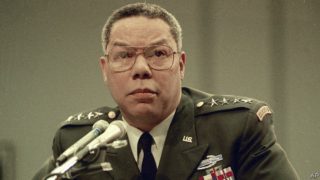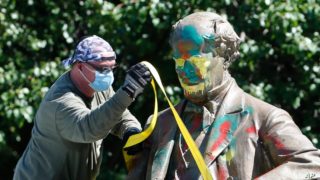COLIN POWELL was driving to his army base in Fort Benning, Georgia, in the early 1960s when he decided to stop at a drive-in restaurant. He had returned from Vietnam in 1963 with a Purple Heart and Bronze Star. The puzzled waitress asked whether he was a Puerto Rican or, perhaps, an African student. “No,” he replied. “I’m a Negro. I’m an American. And I’m an Army officer.” The waitress suggested he wait around the back where he might be passed a burger from the back window.
Mr Powell, who had suffered from blood cancer and Parkinson’s disease, died from covid-related complications at the age of 84 on October 18th. He would recall that moment in a memoir, decades later. “My eye was on an Army career for myself and a good life for my family,” he wrote. Within three decades he would become not only the most senior black military officer in American history, but also the most prominent American soldier, of any race, of the late 20th century.
Mr Powell was born in the Harlem district of New York in 1937, growing up in a working-class Jamaican family in the south Bronx. At the City College of New York, he joined the Reserve Officers’ Training Corps and was commissioned as a second lieutenant in 1958. That was less than a decade after the army had been desegregated by President Harry Truman. After serving as a platoon leader in West Germany, he chose to stay in the army. “I did not know anything but soldiering,” he wrote later. “And for a black, no other avenue in American society offered so much opportunity.”
There followed two gruelling tours of Vietnam, one from 1962 to 1963 and then, in the unit responsible for the notorious My Lai massacre, in 1968. By then, Mr Powell’s star was rising and he was sent to a fellowship in the Nixon White House in 1972. The job was a “defining experience”, he would tell an interviewer, teaching him that politics was “greased by compromise and consensus”. The role gave him proximity to power and put him on the path to becoming a senior adviser to Caspar Weinberger, Ronald Reagan’s secretary of defence, and then, in 1988, Mr Reagan’s national security adviser, at a time when the office had been roiled by the Iran-Contra scandal.
In 1989, having become one of the youngest four-star generals in American history during peacetime, at the age of 52, Mr Powell beat off competition from more than 30 others to become the chairman of the joint chiefs of staff—the principal military adviser to the president, and a position whose importance and authority had been bolstered by far-reaching military reforms earlier in the decade.
When Iraq invaded Kuwait in 1990, General Powell was discomfited by President George H.W. Bush’s commitment to responding with force. At his desk in the Pentagon, he is said to have displayed an epigram from Thucydides, the Greek historian: “Of all manifestations of power, restraint impresses men most.” But his approach to waging the war which ensued—with overwhelming force—became the basis of what would become known as the Powell doctrine, the notion that America should go to war only when, among other conditions, vital national security interests were at stake, the objectives clear and attainable, all other options exhausted and an exit strategy in place.
“Powell has become a folk hero,” wrote the Los Angeles Times in April 1991, “a living, breathing recruiting poster with a beer-barrel chest, a blacksmith’s arms and the bearing of a centurion.” Some in Congress even spoke of granting him a fifth star, an honour last granted to Omar Bradley in 1950. As he approached retirement two years later, victorious in war—though sullied by a fiasco in Somalia—and at the helm of America’s armed forces during what, in hindsight, would turn out to be a relatively brief spell of uncontested military supremacy, there were rumblings that he would stand against Bill Clinton for the presidency in 1996.
He ruled that out in 1995, admitting that he lacked the “fire in the belly”. But he went on to endorse George W. Bush in 2000, and was rewarded by being made secretary of state, in charge of American diplomacy. It was, it turned out, a poisoned chalice. Mr Powell became the public face of the Bush administration’s dubious case for war against Iraq in 2003. A speech at the UN in February 2003, in which he declared, wrongly, that “there can be no doubt that Saddam Hussein has biological weapons”, was a “blot” on his record, he admitted after his retirement in 2005.
In one sense, Mr Powell’s career reflected the arc of American military history. He cut his teeth in a force that endured stinging defeat in Vietnam, oversaw its revival in the deserts of Kuwait and, from the cabinet, saw its renewed humiliation in Iraq. In politics, too, the trajectory was one of disillusionment. “I believe I can help the party of Lincoln move once again close to the spirit of Lincoln,” he declared in 1995, when announcing that he had joined the Republican Party. But after the invasion of the Capitol by supporters of President Donald Trump on January 6th, Mr Powell conceded defeat. “I can no longer call myself a Republican,” he acknowledged.
By The Economist





